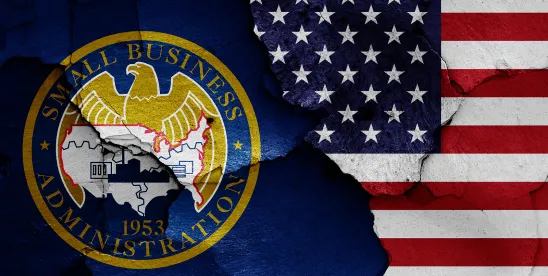| Go-To Guide: |
|
Effective Jan. 16, 2025, the United States Small Business Administration (SBA)’s Final Rule will significantly impact mergers & acquisitions involving small business government contractors and investors in the government contracting industry. A September 2024 GT Alert summarizes important aspects of the SBA’s Proposed Rule and discusses key changes that might impact small business government contractors. The Final Rule echoes much of the Proposed Rule’s language and will affect the landscape for small business contractors and investors in the federal government contracting industry.
This GT Alert highlights several aspects of the Final Rule.
Small Business Recertification Applicable to Multiple Award Contracts
Small businesses government contractors must recertify their size and small business program status (i.e., 8(a), HUBZone, women-owned, or service-disabled veteran-owned) within 30 days of a merger, sale, or acquisition. Traditionally, following a recertification, the size of a small business (including its affiliates) was determined at the time the business submitted its initial offer that included price. When the small business received a contract award, the business was generally considered small throughout the life of that contract (including options thereunder). Before the Final Rule, that was generally true even where a large business merged with or acquired the small business.
Single Award vs. Multiple Award Contracts
The Final Rule draws a distinction between single award and MACs. Whether a small business can continue to receive future orders under an underlying contract after a disqualifying recertification depends upon whether the underlying contract or agreement is a single award or MAC. For single award small business contracts (or any unrestricted contract), a business that recertifies as other than small (i.e., “large”) remains eligible to receive orders and options. Conversely, for MACs set-aside for small businesses, a business that recertifies as other than small would be ineligible to receive orders and options.
One-Year Delay
This aspect of the Final Rule delays the effective date to Jan. 17, 2026, and explicitly states that it should not be retroactively applied. In response to industry comment, the Final Rule notes that it makes sense to allow some time to adapt and plan how best to comply with the new recertification provisions. Once in effect, the Final Rule will apply to existing contracts, but the provisions making businesses ineligible for orders or options after disqualifying recertifications will apply only to future disqualifying recertifications (i.e., ones that occur after Jan. 17, 2026). Accordingly, businesses that have made or will continue to make disqualifying recertifications before Jan. 17, 2026, will continue to be eligible to receive orders and options after Jan. 16, 2025.
The Final Rule’s delayed application will increase transaction volume involving small business contractors through Jan. 17, 2026. Until that date, the current regulatory regime will govern transactions involving a small business, meaning small businesses with set-aside MACs will continue to be eligible for set-aside orders even after they are acquired by a large business. If the transaction closes after Jan. 17, 2026, however, small businesses will not be eligible for set-aside orders or new MAC options.
This aspect of the Final Rule takes effect Jan. 17, 2026.
Eliminating the Federal Supply Schedule Exception
General Services Administration (GSA) Federal Supply Schedule (FSS) Multiple Award Schedule (MAS) Contracts
There has been a recognized exception to recertification requirements for set-aside orders or BPAs placed against an FSS contract, meaning that size status would be determined by the underlying FSS contract award date (or the date of its recertification for an option exercise). The Final Rule eliminates this exception and is not subject to the one-year delay. Therefore, as of Jan. 16, 2025, if a small business submits a disqualifying recertification, it will be ineligible for set-aside orders or BPAs under its GSA FSS MAS contract.
This aspect of the Final Rule takes effect Jan. 16, 2025.
Notable Exception: Transactions Between Two Small Businesses
The Final Rule carves out an exception for transactions involving two small businesses. In response to industry comment, the Final Rule amends which businesses will be ineligible for orders and options after a disqualifying certification due to merger, sale, or acquisition.
The Final Rule makes ineligible only those contract holders that have disqualifying recertifications involving a merger, sale, or acquisition with a large business. Where two small businesses individually qualify as small before a transaction, the Final Rule allows the contract holder to remain eligible for orders issued under an underlying set-aside MAC. As a result, small businesses will be poised to engage in transactions with other small businesses.
This aspect of the Final Rule takes effect Jan. 16, 2025.
Application to Outstanding Offers (the “180 Day Rule”)
The Final Rule also clarifies the effect of transactions that occur after a small business submits an offer for a set-aside opportunity and prior to award. Traditionally, if a merger, sale, or acquisition occurred after 180 days from the date in which a small business submitted an offer and the business could not recertify as small following the transaction, the government could still award to the business. This was generally true for single award and MAC set-asides.
Under the Final Rule, if the transaction occurs within 180 days of offer submission and the business submits a disqualifying recertification, the business will be ineligible for award.
But for transactions that occur after 180 days of offer submission, the Final Rule again draws a distinction between single award and MAC set-aside opportunities. If the merger, sale, or acquisition occurs after 180 days of offer submission and the business submits a disqualifying recertification, the business will still be eligible for single award set-asides. But if the transaction occurs after 180 days of offer submission and the business submits a disqualifying recertification, the business will be ineligible for a set-aside MAC or task order thereunder.
This aspect of the Final Rule takes effect Jan. 16, 2025.
Authorization to Protest a Size Recertification
Traditionally, there was no mechanism to allow a size protest or request for a formal size determination from another interested small business who believes that a size recertification is incorrect. For example, if a small business recertified as small following a merger, sale, or acquisition, another MAC contract holder could not challenge that recertification arguing the small business was not eligible for award.
The Final Rule authorizes MAC contract holders to request a formal size determination relating to size recertifications. Because the Final Rule will render a small business ineligible for orders set-aside under a MAC following a disqualifying recertification, the SBA believes that other contact holders should have the ability to question a size recertification.
This aspect of the Final Rule takes effect Jan. 16, 2025.
Conclusion
These changes will impact M&A activity, size protests, and related small business counseling and compliance. Small business regulations are consistently one of the most active areas of regulatory change. With a new administration and Congress, there is potential for further changes to these or other small business regulations.





 />i
/>i

